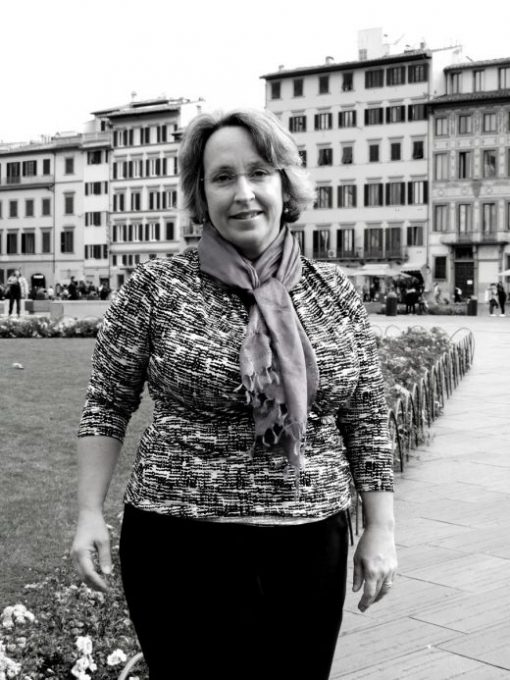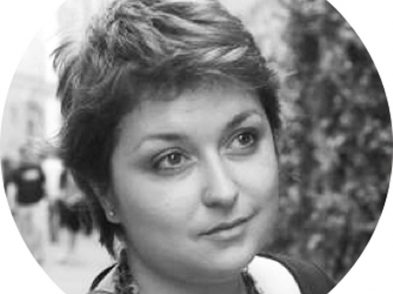Before Elise Chapin and I ever met, our mothers were friends. Looking back on their era—the late 50s and 60s in Somerset County, New Jersey—their lives seems so distant from our own: debutante parties and dressmakers, fox hunting and fancy sandwiches, home economics and hired help. They were well educated, well traveled and well heeled. Above all, they were women friends who saw each other through changing times and intense personal growth. Recently, I met up with Elise to share reflections on the past and recent news. As the Coordinator of the UNICEF Baby Friendly Initiative in Italy, Elise has a unique perspective on life in Florence that generations of parents will be able to appreciate.

OS: What brought you to Italy initially?
EC: Curiosity and good luck. I met a woman from Florence while I was at college and she talked a lot about Florence and Italy in general, so I got curious and decided to go for a semester with a friend. That was in 1985.
OS: Tell me about your job. What are your responsibilities and objectives?
EC: I work at the Italian National Committee for UNICEF where I coordinate the Baby Friendly Initiatives, a series of programs designed to help parents make informed feeding choices for their babies and get the support they need from qualified personnel, whether in a hospital or consultorio setting. The Baby Friendly Hospital Initiative was launched internationally by the World Health Organization and UNICEF in the early ‘90s and began in Italy about 15 years ago. Soon after starting it, we realized we needed to expand our efforts to include the local health clinics (consultori) that are part of the Italian health system, and so the Baby Friendly community was born. The programs have a series of requirements called “steps” that need to be done, as well as ethical aspects that must be respected in order to protect families and healthcare workers from commercial pressures by companies that produce baby formula and other foods.
More recently, we have been promoting Baby Pit Stops, where mothers can breastfeed and change their babies. UNICEF Baby Pit Stops can be found at the Uffizi, Palazzo Pitti, the Oblate Library, the Isolotto Library, as well as other places in the greater Florence area. We have recently launched Breastfeeding-Friendly University programs for people studying to become midwives or pediatric nurses, and hope to expand to medical programs, too.
UNICEF Italy has a core group of people working on the initiatives and a network of healthcare providers on hospitals and consultori that have already been designated “Baby Friendly”. We organized an annual conference about the Baby Friendly initiatives and advocate for babies and families at many levels: the health systems, regional and national governments. The Tuscan Region has been particularly attentive to these requests and is the region in Italy with the greatest number of baby friendly designations.
OS: What are some of the major cultural differences (US/IT) regarding breastfeeding?
EC: I think there were more differences when we were having our children in the ‘90s. More women in Italy start breastfeeding than in the US, but a greater percentage quit altogether or start complementing with formula, so that by 6 months the US is ahead of Italy in exclusive breastfeeding, where fewer than 1 in 10 women in Italy still do at 6 months. In the past few years, breastfeeding has become a
big part of the national agenda in the US, and the Baby Friendly program there has really taken off, thanks to a positive
“perfect storm” of government documents and funding.
OS: How is raising children in Italy for an American different, difficult or better?
EC: That is a tough question. First off, if you have a job, the maternity leave is much better here than in the US (20 weeks paid leave vs. 6 weeks unpaid leave). You learn a lot about Italy once you have children and you come face to face with customs that are a given here, while they aren’t in the US. Some of them are better, some are baffling. But I learned so much about little things once I became a parent.
OS: How can the local expat community get involved in the work that you do?
EC: UNICEF is always looking for volunteers to help out with awareness raising and fundraising campaigns, in general. Right now, we are focusing on the “Children in Danger” campaign about children who live in war-torn situations or are fleeing from them. There are also a series of programs specifically for children in Italy: the Baby Friendly Initiatives, Child-Friendly Cities, Child-Friendly Schools and Child-Friendly Sports. We are working to see that children in Italy have all the rights guaranteed to them by the Convention on the Rights of the Child. If someone is specifically interested in breastfeeding, opening a Baby Pit Stop is a great and inexpensive way to help. All you need is a place to sit and a changing table!
FLORENCE QUICKFIRE
Best location to nurse your baby?
For the view, the Baby Pit Stop at the Uffizi, which looks out on Palazzo Vecchio and piazza della Signoria.
Best children’s bookstore?
Tough call. I like the libraries: the children’s library housed at St. James’ Church (via Rucellai, near the station) or the Biblioteca dei Ragazzi in via Tripoli.
Best bar for an aperitivo?
Hotel Lucchesi rooftop bar with amazing view of Florence.
One place in Florence that makes you happy or inspires you?
Viale dei Colli. Such a beautiful view over the city.
Biggest cultural difference between Italians and Americans?
Clothing and what’s appropriate in what season.
Favorite place in Tuscany outside Florence?
Livorno. Tons of history, fascinating port (like something out of a Richard Scarry book) and good food.
Something you will never get used to about Italians or about living here?
Why you would want to go to the post office to pay bills instead of doing it online?








